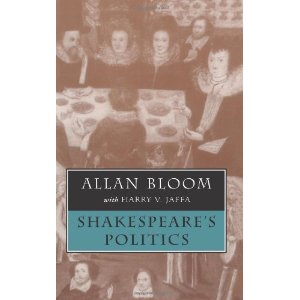Shakespeare's Politics, with Harry V. Jaffa, Basic Books, 1964. Reprint, University of Chicago Press, 1981.
Excerpt:
Shakespeare has set his plays in many nations and at various times in history. This is a good beginning for the investigation of his teaching, for various nations encourage various virtues in men; one cannot find every kind of man in any particular time and place. Just the difference between paganism and Christianity has an important effect on the kinds of preoccupations men have. To present the various possibilities, the typical men have to be in an environment in which they can flourish. The dates and places of Shakespeare’s plays were chosen with a view to revealing the specific interests of the heroes. It was only in Venice that Othello and Shylock could act out their potentials; they were foreigners, and only Venice provided them freedom and a place in the city. Only in Rome could one see the course of political ambition free of other goals which mitigate it. It would be a worthwhile project to spend a lifetime studying the settings of the plays in relation to the plots, trying to see what are the typical problems of what time and what nation. All this would be with a view to distinguishing what Shakespeare thought the best kinds of men and what advantages and disadvantages go with what ways of life. We are in need of generations of criticism—naive criticism which asks the kinds of question of Shakespeare that Glaucon and Adeimantus once posed to Socrates. How should we live? Is it best to be a ruler or a poet? Can one kill a king? Should one’s parents be disobeyed for the sake of love? And so on endlessly.
Schiller pointed out that modern times are characterized by abstract science on the one hand and unrefined passions on the other and that the two have no relation. A free man and a good citizen must have a natural harmony between his passions and his knowledge; this is what is meant by a man of taste, and it is he whom we today seem unable to form. We are aware that a political science which does not grasp the moral phenomena is crude and that an art uninspired by the passion for justice is trivial. Shakespeare wrote before the separation of these things; we sense that he has both intellectual clarity and vigorous passions and that the two do not undermine each other in him. If we live with him awhile, perhaps we can recapture the fullness of life and rediscover the way to its lost unity.
Online:
Chapter 1 [pdf]
Google Books
Amazon

